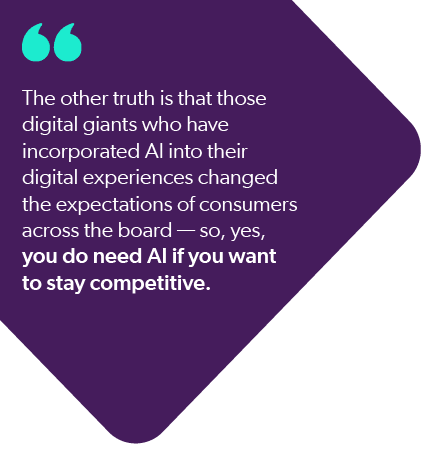If you’re a business owner today, you’ve likely been told that you “need some artificial intelligence (AI)” to succeed in the marketplace. Indeed, the majority of companies that have successfully deployed AI report that it proves its worth. At the same time, as of last year, only about 14% of firms have adopted AI capabilities in their businesses.
If AI consistently proves its worth, why is it that so few businesses manage to deploy it successfully? And is it really true that businesses absolutely need AI today, or is it just a fancy buzzword that’s supposed to make your business look more legit?

Building your own AI solution is an incredibly complex process, and 90.9% of firms cite people and process challenges as the biggest barriers to adopting AI and becoming a data-driven organization. But an even bigger barrier is that most business leaders don’t have a clear understanding of what AI is supposed to help them achieve.
The truth is that unless they’re a digital giant like Amazon or Google, most companies shouldn’t try to build their own AI solution, as the cost of building and managing it will trump any real benefits. The other truth is that those digital giants who have incorporated AI into their digital experiences changed the expectations of consumers across the board—so, yes, you do need AI if you want to stay competitive.
But the good news is that today this technology is available to anyone in the form of off-the-shelf AI—a third-party AI solution.
What is Off-the-Shelf AI?
Off-the-shelf AI—also called AI on tap, AI as a Service (AIaaS), and productized AI—is a third-party out-of-the-box AI solution. Essentially, it is a set of custom-designed algorithms to build models for specific tasks.
Off-the-shelf AI operates much like software as a service (SaaS) but involves one of the technologies that fall under the broad umbrella of AI—such as machine learning, NLP, or computer vision, and other applications such as reasoning and learning, that were built to carry out tasks that mimic those typically performed by humans.

Like SaaS, off-the-shelf AI integrates into your business processes in a seamless way. Just think of the many SaaS services that you use today in your personal and business life—Google Docs, Salesforce, Hubspot, etc.—that you even forget but that are constantly managed and optimized for you. In the same way, anyone can use off-the-shelf AI models, and they are optimized constantly as part of your subscription.
Off-the-shelf AI solutions typically are offered by cloud providers, which means you get all the benefits associated with a cloud-based service. The platform is optimized constantly, and you can benefit from the frequent updates instantly. In the case of Coveo, the systems are always on, operating with 99.9%+ of uptime.
AI as a Service (AIaaS)
Being cloud-based also makes horizontal scaling easy. In addition to your primary deployment region (the physical center of your organization, which hosts all services and data required for your organization to function) you have the ability to deploy to additional satellite regions, improving query time for users there.

Just like you don’t need any technical knowledge to use your SaaS solution, off-the-shelf AI means you don’t need to hire in-house data science experts. All the stages of the model life cycle—data collection, model training, and model serving—are integrated and fully managed by your provider within the same platform. At the same time, you always have the ability to tune the system to fit the needs of your business better.
In essence, off-the-shelf AI democratizes AI, making it accessible even to companies without robust technical teams. According to some estimates, off-the-shelf AI (or AIaaS) market that was valued at $3.91 billion in 2020 is expected to reach $43.298 billion by 2026, with a growth rate of 48.9% between 2021 and 2026. And there are good reasons for it.
Off-the-Shelf AI in Action
So what can AI—and specifically off-the-shelf-AI—help you achieve? The short answer is, it will help you increase product or information conversion rates by keeping up with consumers’ expectations.
Today, more than ever, people expect their digital experience to be relevant and personal. If people viewed personalization as creepy a few years ago, today they expect it. Specifically, in 2019 about 60% of people expected personalization, and a year later 80% of customers expected it. The general consensus is that in 2021, personalization will become a necessity in marketing.

Off-the-shelf AI can be used to create relevant and personalized digital experiences—those that allow individuals to find what they need, when they need it.
Off-the-shelf AI achieves this by bringing together models specifically designed to enhance three essential components of a relevant digital experience: personalization, search, and recommendation.
AI-Powered Personalization

If you’re not a digital giant who has access to huge amounts of data, bringing personalization into your website, online store, or customer self-service portal will be difficult to achieve on your own.
Off-the-shelf AI is built in to enable you to start personalizing your content from day one. Without any prior data about the customer, websites can begin to personalize content based on various factors—for example, the customer’s location, the time of day they arrive, and what past customers have done.
Then in-session personalization begins. Real-time intent-driven personalization means that at every step the system will learn more and more about the user, guiding their buying journey with the help of behavioral data including query terms, clicks, and more. So, if a customer types in “shoes,” the website won’t just spit out a long list of all the shoes in the store, but will suggest categories to get a better sense of what the customer is looking for. Furthermore, with logged-in users, the system can make use of tools such as user profile and user clustering, further predicting user affinities based on past interactions, topics of interest, and affiliations.
A platform powered by off-the-shelf AI continuously learns and self-optimizes to generate better experiences. With every new user behavior and signal, the search becomes progressively richer and more relevant—and more personalized—automatically.
Some off-the-shelf AI vendors (Coveo included) also allow you to combine your personalization data with your existing data from your customer data platforms (CDP) and beyond. Obviously, the more data and platforms you connect, the more effective your AI-powered personalization gets, as signals captured on one digital property will inform your personalization strategy everywhere.
AI-Powered Search

People’s search queries can be quite cryptic and lack the necessary context needed to find the relevant information. Yet, those users still expect to be understood and have that understanding be reflected in results and the overall experience — whether that be on an organization’s intranet or product catalog.
Off-the-shelf AI efficiently deals with challenges such as the inconsistency of content, the ambiguity of language, and the uncertainty of intent in order to understand what a user needs and to surface it to them. On the most basic level, AI should be able to help with automatic language detection, word sense disambiguation, and statistical spelling and vocabulary correction.
But what makes the AI-powered search function truly intelligent is that it constantly learns from data and makes predictions. Any time a user performs an action on your website or support portal, they provide data about what’s useful and what isn’t. If someone submits a search query and then clicks on the fifth search result, they’re essentially telling the algorithm what’s most relevant to them. Likewise, any time your website visitors download content, visit product pages, watch videos, or contact your support agents via online chat, that also implicitly tells the algorithm about the relevance of the content in question. All these data are processed by the system and are used to further optimize the user experience.
That means that every time a user types into the search box, the machine learning model takes into account not just the typed query but the previous actions and context. When it comes to query processing, intelligent search guarantees not just better accuracy—but improved relevance at the individual level.
To maximize the value, AI-powered search also should be unified. Users should not have to do multiple searches in multiple locations—a single search should simply surface relevant results regardless of where that content lives in backend systems.
For instance, Coveo’s intelligent search indexes all types of content—structured or unstructured—making it easy to locate. Furthermore, the system has access to all of your content from all sources (websites, knowledge bases, and catalogs) through one unified index.
AI-Powered Recommendation

Finally, your off-the-shelf AI solution should include an AI-powered recommender. As with intelligent search technology, an AI-powered recommendation model helps generate a holistic view of a given user and, therefore, make the experience relevant to them as an individual. It’s important to remember that search and recommendations are intimately connected. The data collected by the search can be used to power more relevant recommendations throughout the site.
An AI-powered recommender can give you context-aware recommendations, meaning it takes into account where the person is on their digital journey and what they are after—perhaps products or content—and makes recommendations based on that. The recommender also has a way to orchestrate the most relevant journey for each user.
For example, for repeat customers, the recommendations could be interest-based or past-purchase-based. For first-time or anonymous buyers they could be based on frequently viewed or bought together items, or based on the information about user intent gathered during this particular session.
Off-the-shelf AI platforms also frequently use data stitching to improve recommendations, meaning they can connect current context, user history, and more, from across all of your data platforms to serve the right content at the right moment, even if the customer’s needs change over time.
These models consistently self-optimize, drawing insights from and responding to your changing product catalog, content, or user behavior. As user profiles are dynamically enriched by actions and affinities, the system is able to drive ever-more-relevant recommendations, and it can even let you know when it’s time to retrain your models.
Your AI-powered recommender should be not only powerful but also highly tunable. The recommender that’s part of the Coveo platform uses models to continuously deliver personalized results while allowing you to adjust some aspects of it to test how specific products or categories work best for your business. And as with other parts of the system, you don’t have to build anything from scratch. You can just preview different configurations, then optimize and refine.
Why Now?
Providing relevant and personalized digital experiences has never been more important. People don’t just want to be treated like a member of their social group (e.g., a middle-aged suburban soccer mom or a hip urban millennial). They expect to be treated as individuals and shown products that are relevant to them as the unique individual that they are.

The technology that enables personalization is here, and it is already widely used by the digital giants, setting customer expectations sky high. This technology is now widely available to anyone in the form of off-the-shelf AI solutions, meaning it will soon become a necessity for any business that wants to stay competitive.
Dig Deeper
Adopting and implementing off-the-shelf AI in the form of a relevance platform enables you to deliver the experiences your customers expect, with the resources you already have at your disposal.
To learn more about what a relevance platform can do for you, read: Make every digital experience a relevant one.
Care to experience the democratization of AI for yourself? Try AI-powered search today.


